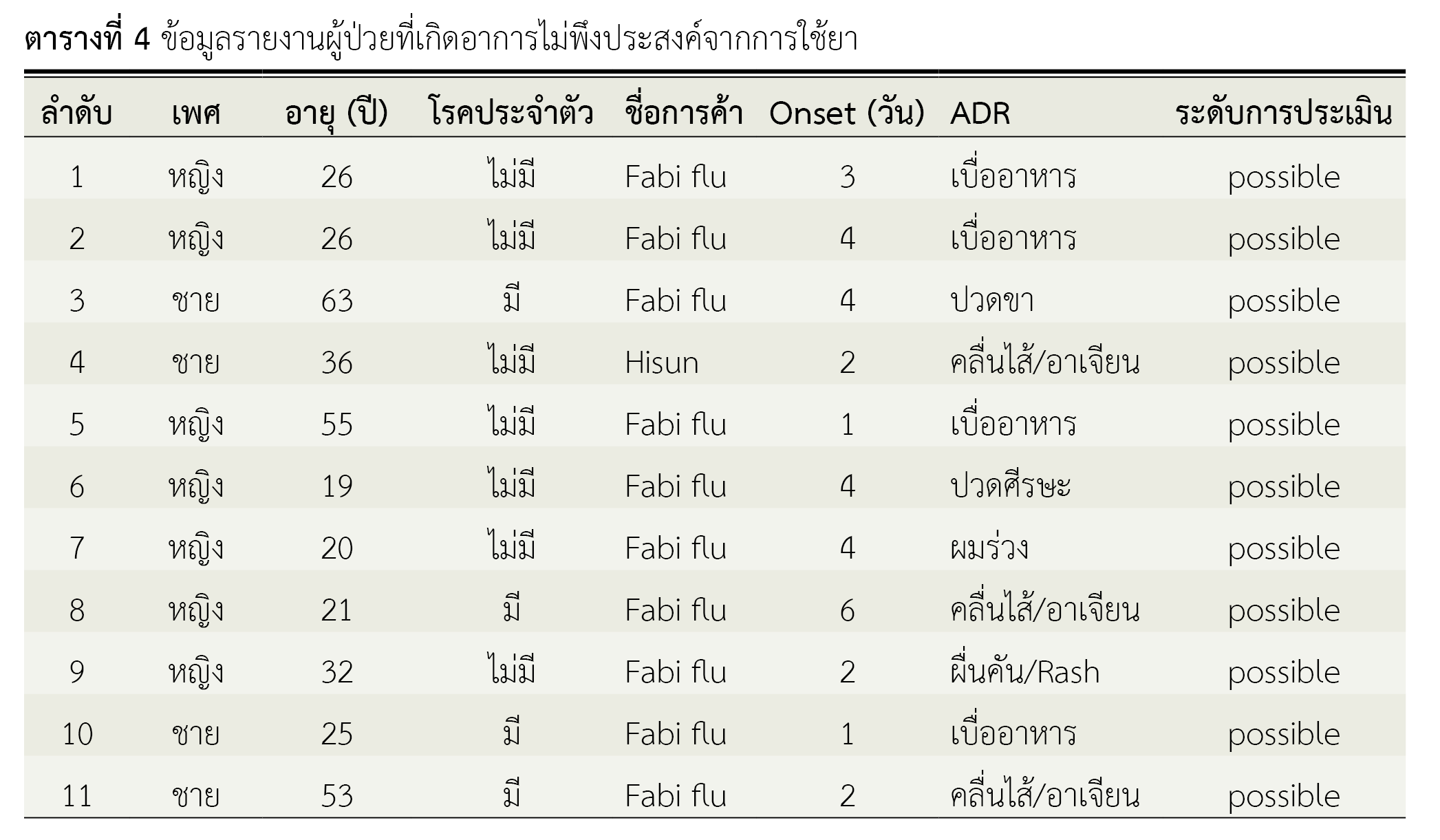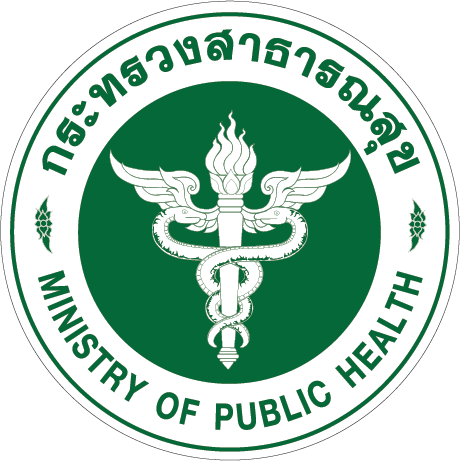Incidence and Characteristics of Adverse Drug Reactions of Favipiravir among COVID-19 Patients at Sisaket Hospital
Keywords:
favipiravir, adverse drug reaction, intensive monitoring programAbstract
Background: Favipiravir, a newly approved drug for Covid-19 treatment , had conditional approval. Due to limited safety information, healthcare professionals are required to adhere to an intensify safety monitoring program (SMP) for this drug.
Objectives: This study aims to investigate the incidence and characteristics of adverse drug reactions of favipiravir among COVID-19 patients at Sisaket Hospital
Methods: Follow up of adverse reactions from favipiravir in diagnosed with COVID-19, non-severe patients , aged 18 years and over who received the drug at least 5 days between November 2021 to March 2022 in a total of 200 cases via phone calls . Data were recorded in the data collection form and analyzed with descriptive statistics.
Results: The mean age of the subjects was 37.6±16.22 years, 63% of them were female. Adverse reactions were observed in 11 patients (5.5%). The most commonly adverse reactions were gastrointestinal intolerance, such as loss of appetite in 4 patients (2.0%), nausea/vomiting in 3 patients (1.5%). Other adverse reactions included hair loss, headache, myalgia and skin rash (0.5% for each).
Conclusions: Incidence of adverse reactions of favipiravir in non–severe COVID-19 patients were found in about 5%, most of which were mild gastrointestinal symptoms and they demonstrated complete recovery upon discontinuation of the drug.
References
สุรัยยา หมานมานะ, โสภณ เอี่ยมศิริถาวร, สุมนมาลย์ อุทยมกุล. โรคติดเชื้อไวรัสโคโรนา 2019 (COVID-19). วารสารสถาบันบำราศนราดูร [อินเทอร์เน็ต]. 2563 [สืบค้นเมื่อ 25 พ.ค. 2566];14(2):124-33. สืบค้นจาก: https://he01.tci-thaijo.org/index.php/bamrasjournal/article/view/240349/
กรมการแพทย์. แนวทางเวชปฏิบัติ การวินิจฉัย ดูแลรักษา และป้องกันการติดเชื้อในโรงพยาบาล กรณีติดเชื้อไวรัสโคโรนา 2019 (COVID-19) สำหรับแพทย์และบุคลากรสาธารณสุข ฉบับปรับปรุง วันที่ 9 กันยายน พ.ศ. 2564 [อินเทอร์เน็ต]. นนทบุรี: กรมการแพทย์ กระทรวงสาธารณสุข; 2564 [สืบค้นเมื่อ 20 กันยายน 2564]. สืบค้นจาก: https://covid19.dms.go.th/Content/Select_Landding_page?contentId=150
พรรณี ลีลาวัฒนชัย, ธนานันต์ ตัณฑ์ไพบูลย์. Favipiravir สำหรับรักษาโรคติดเชื้อไวรัสโคโรนา 2019. วารสารเภสัชกรรมโรงพยาบาล [อินเทอร์เน็ต]. 2564 [สืบค้นเมื่อ 20 กันยายน 2564];31(2):141-57. สืบค้นจาก: https://he02.tci-thaijo.org/index.php/TJHP/article/view/250567
ยุคล จันทเลิศ. Favipiravir. วารสารศูนย์การศึกษาแพทยศาสตร์คลินิก โรงพยาบาลพระปกเกล้า [อินเทอร์เน็ต]. 2564 [สืบค้นเมื่อ 20 กันยายน 2564];38(2):232-36. สืบค้นจาก: https://he02.tci-thaijo.org/index.php/ppkjournal/article/view/250937
UpToDate, Inc. Favipiravir. In: UpToDate Web Applications Access [Internet]. n.p.: Wolters Kluwer; 2023 [cited 2023 May 25]. Available from: https://www.wolterskluwer.com/en/solutions/uptodate (Subscription required to view)
สำนักงานคณะกรรมการอาหารและยา. สรุปรายงานอาการไม่พึงประสงค์จากการใช้ยา ประจำปี 2563-2564 [Spontaneous reports of adverse drug reaction 2020-2021]. นนทบุรี: สำนักงานคณะกรรมการอาหารและยา กระทรวงสาธารณสุข; 2564.
ระพีพรรณ ฉลองสุข. การกำหนดขนาดตัวอย่าง (sample size). วารสารไภษัชยนิพนธ์ [อินเตอร์เน็ต]. 2550 [สืบค้นเมื่อ 20 ส.ค. 2564];4(1):1-19. doi: 10.14456/tbps.2009.1. สืบค้นจาก https://li01.tci-thaijo.org/index.php/TBPS/article/view/33065
Ergür FÖ, Yıldız M, Şener MU, Kavurgacı S, Ozturk A. Adverse effects associated with favipiravir in patients with COVID-19 pneumonia: a retrospective study. Sao Paulo Med J. 2022;140(3):372-77. doi: 10.1590/1516-3180.2021.0489.R1.13082021.
ชุมชนเภสัชกรนักปฏิบัติเรื่องการประเมินอาการไม่พึงประสงค์จากการใช้ยา ประเทศไทย (ADCoPT). แนวทางปฏิบัติในการทำงานติดตามอาการไม่พึงประสงค์จาก การใช้ยา. กรุงเทพ: สมาคมเภสัชกรรมโรงพยาบาล (ประเทศไทย); 2559.
ธีวรา โลมรัตน์, ตุลาการ นาคพันธ์. การประเมินประสิทธิผลของยาฟาร์วิพิราเวียร์ในผู้ป่วยโควิด-19 ที่รับการรักษาในโรงพยาบาลกุดข้าวปุ้น จังหวัดอุบลราชธานี. วารสารสุขภาพและสิ่งแวดล้อมศึกษา [อินเทอร์เน็ต]. 2565 [สืบค้นเมื่อ 25 พ.ค. 2566];7(2)8-18. สืบค้นจาก: https://so06.tci-thaijo.org/index.php/hej/article/view/257026
Kaur RJ, Charan J, Dutta S, Sharma P, Bhardwaj P, Sharma P, et al. Favipiravir Use in COVID-19: Analysis of Suspected Adverse Drug Events Reported in the WHO Database. Infect Drug Resist. 2020;13:4427-38. doi: 10.2147/IDR.S287934.
Hung DT, Ghula S, Aziz JMA, Makram AM, Tawfik GM, Abozaid AA, et al. The efficacy and adverse effects of favipiravir on patients with COVID-19: a systematic review and meta-analysis of published clinical trials and observational studies. Int J Infect Dis. 2022;120:217-27. doi: 10.1016/j.ijid.2022.04.035.
กองยุทธศาสตร์และแผนงาน. ศูนย์เฝ้าระวังความปลอดภัยด้านผลิตภัณฑ์สุขภาพ. คู่มือการดำเนินงานการเฝ้าระวังความปลอดภัยจากการใช้ยาที่ใช้รักษาโรคติดเชื้อไวรัสโคโรนา 2019 (COVID-2019) เชิงรุก [อินเทอร์เน็ต]. นนทบุรี: ศูนย์เฝ้าระวังความปลอดภัยด้านผลิตภัณฑ์สุขภาพ กองยุทธศาสตร์และแผนงาน สำนักงานคณะกรรมการอาหารและยา กระทรวงสาธารณสุข; 2565 [สืบค้นเมื่อ 25 พ.ค. 2566]. สืบค้นจาก: https://hpvcth.fda.moph.go.th/guideline-covid-19-drugs/

Downloads
Published
How to Cite
Issue
Section
License
Copyright (c) 2023 Health Administration Division, Office of the Permanent Secretary, Ministry of Public Health and The Society of Hospital Pharmacist, Ministry of Public Health

This work is licensed under a Creative Commons Attribution-NonCommercial-NoDerivatives 4.0 International License.
ข้อความภายในบทความที่ตีพิมพ์ในวารสารเภสัชกรรมคลินิกทั้งหมด รวมถึงรูปภาพประกอบ ตาราง เป็นลิขสิทธิ์ของกองบริหารการสาธารณสุข สำนักงานปลัดกระทรวงสาธารณสุข และ ชมรมเภสัชกรโรงพยาบาลกระทรวงสาธารณสุข การนำเนื้อหา ข้อความหรือข้อคิดเห็น รูปภาพ ตาราง ของบทความไปจัดพิมพ์เผยแพร่ในรูปแบบต่าง ๆ เพื่อใช้ประโยชน์ในเชิงพาณิชย์ ต้องได้รับอนุญาตจากกองบรรณาธิการวารสารเภสัชกรรมคลินิกอย่างเป็นลายลักษณ์อักษร
กองบริหารการสาธารณสุข สำนักงานปลัดกระทรวงสาธารณสุข และ ชมรมเภสัชกรโรงพยาบาลกระทรวงสาธารณสุข อนุญาตให้สามารถนำไฟล์บทความไปใช้ประโยชน์และเผยแพร่ต่อได้ โดยอยู่ภายใต้เงื่อนไขสัญญาอนุญาตครีเอทีฟคอมมอน (Creative Commons License: CC) โดย ต้องแสดงที่มาจากวารสาร – ไม่ใช้เพื่อการค้า – ห้ามแก้ไขดัดแปลง, Attribution-NonCommercial-NoDerivatives 4.0 International (CC BY-NC-ND 4.0)
ข้อความที่ปรากฏในบทความในวารสารเป็นความคิดเห็นส่วนตัวของผู้เขียนแต่ละท่านไม่เกี่ยวข้องกับกองบริหารการสาธารณสุข สำนักงานปลัดกระทรวงสาธารณสุข และ ชมรมเภสัชกรโรงพยาบาลกระทรวงสาธารณสุข และบุคลากรในกองฯ หรือ ชมรมฯ แต่อย่างใด ความรับผิดชอบองค์ประกอบทั้งหมดของบทความแต่ละเรื่องเป็นของผู้เขียนแต่ละท่าน หากมีความผิดพลาดใด ๆ ผู้เขียนแต่ละท่านจะรับผิดชอบบทความของตนเอง ตลอดจนความรับผิดชอบด้านเนื้อหาและการตรวจร่างบทความเป็นของผู้เขียน ไม่เกี่ยวข้องกับกองบรรณาธิการ



